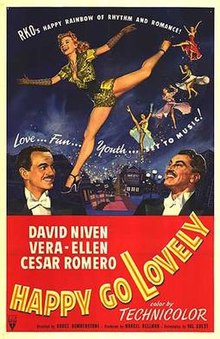Happy Go Lovely is a 1951 British musical comedy film in Technicolor, directed by H. Bruce Humberstone and starring Vera-Ellen, David Niven, and Cesar Romero. The film was made and first released in the UK, and distributed in the US by RKO Radio Pictures in 1952.
| Happy Go Lovely | |
|---|---|
 Movie poster | |
| Directed by | H. Bruce Humberstone |
| Written by |
|
| Produced by | Marcel Hellman |
| Starring | |
| Cinematography | Erwin Hillier |
| Edited by | Bert Bates |
| Music by | Mischa Spoliansky |
Production company | Marcel Hellman Productions (as Excelsior Films Ltd.) |
| Distributed by | |
Release dates | |
Running time | 97 minutes |
| Country | United Kingdom |
| Language | English |
| Budget | $1 million[2] |
| Box office | £230,845 (UK)[3] |
Plot
editWhen chorus girl Janet Jones is late for rehearsal in Edinburgh, Bates, the chauffeur for B. G. Bruno, gives her a ride in Bruno's limousine, starting rumours that she is engaged to the wealthiest man in Scotland. American producer John Frost, her employer, has just had the star of his next show, Frolics to You, walk out on him because of his desperate financial situation. He replaces her with Janet, hoping that Bruno will back his revue, or at least that he can use Bruno's reputation to fend off impatient creditors. Her dressmaker, Madame Amanda, gives her more clothes, and sends the bill to Bruno. Janet's roommate, Mae Thompson, convinces her to continue the deception.
When Bruno receives the bill, he goes to the theatre to investigate. Janet mistakes him for reporter Paul Tracy, who was supposed to interview her. Finding Janet very attractive, Bruno does not correct her error. The two fall in love. Bruno amuses himself by continually asking Janet about her relationship with the millionaire.
Finally, Bruno gives Frost a cheque for £10,000. When Janet finds out, however, she confesses everything. On the opening night of Frolics to You, Bruno takes a box seat. Frost summons the police to have Bruno arrested as an impostor. In between performing on stage, Janet tries to make "Paul Tracy" hide or leave. During the hectic proceedings, Janet blurts out that she loves him. The police catch Bruno, but the inspector in charge recognizes him, much to the surprise of Janet and Frost, and all ends well.
Cast
edit- David Niven as B.G. Bruno
- Vera-Ellen as Janet Jones
- Eve Boswell as Janet's singing voice
- Cesar Romero as John Frost
- Bobby Howes as Charlie, Frost's assistant
- Diane Hart as Mae
- Gordon Jackson as Paul Tracy
- Barbara Couper as Madame Amanda
- Henry Hewitt as Dodds, Bruno's assistant
- Gladys Henson as Mrs. Urquhart, Janet and Mae's landlady
- Hugh Dempster as Bates
- Sandra Dorne as Betty
- Joyce Carey as Bruno's Secretary
- John Laurie as Jonskill, one of the creditors
- Wylie Watson as Stage Door Keeper
- Joan Heal as Phyllis Gardiner, the former star
- Hector Ross as Harold
- Ambrosine Phillpotts as Lady Martin
- Molly Urquhart as Madame Amanda's Assistant
Musical numbers
edit- "MacIntosh's Wedding" - Sung by Joan Heal, danced by Vera-Ellen and Chorus.
- "One-Two-Three" - Sung and danced by Vera-Ellen (dubbed by Eve Boswell) and Chorus.
- "London Town" - Danced by Vera-Ellen and Chorus.
- "Would You - Could You?"' - Sung and danced by Vera-Ellen (dubbed by Eve Boswell)
See also
editReferences
edit- ^ a b "Happy Go Lovely: Detail View". American Film Institute. Retrieved 18 May 2014.
- ^ "Rathvon in on Three-Way British Pic Finance Deal". Variety. 26 April 1950. p. 5.
- ^ Vincent Porter, 'The Robert Clark Account', Historical Journal of Film, Radio and Television, Vol 20 No 4, 2000 p496
Further reading
edit- Craddock, Jim (2005). Videohound's Golden Movie Retriever. Farmington Hills, Michigan: Thomson Gale. ISBN 978-0-7876-7470-0.
- Martin, Mick, and Marsha Porter (2003). DVD & Video Guide 2004. New York: Ballantine Books. ISBN 978-0-345-44994-8.
- Mundy, John (2007). The British musical film. Manchester: Manchester University Press. ISBN 978-0-7190-6320-6.
- Tuska, Jon (1991). Encounters with Filmmakers: Eight Career Studies. Westport, Connecticut: Greenwood Press. p. 33. ISBN 978-0-313-26305-7.
- "Section on the film". Kine Weekly. 31 May 1951.